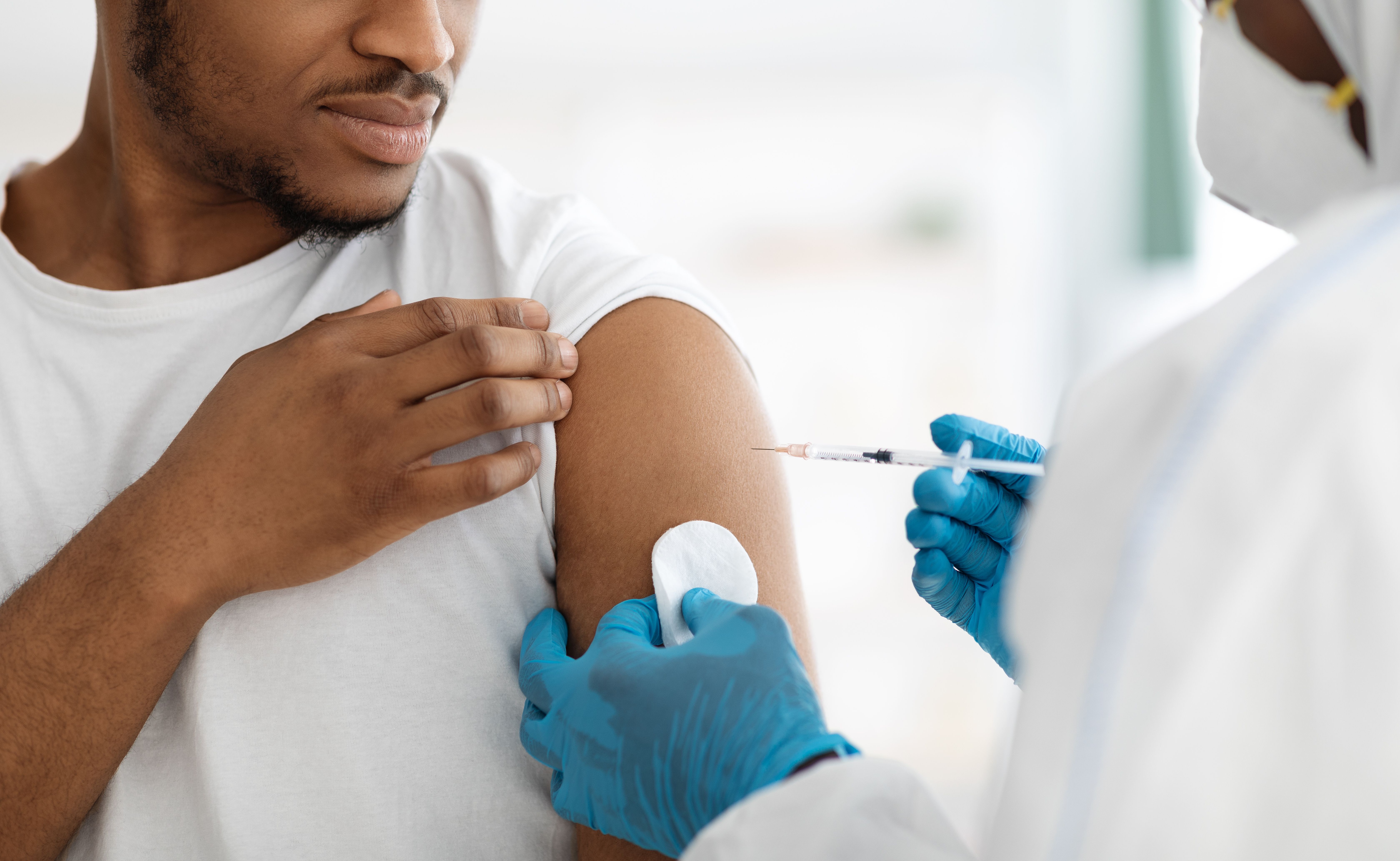Publication
Article
Pharmacy Times
Shots on the Spot: How Pharmacists Are Increasing Flu, COVID-19, and RSV Vaccinations With Immunization Clinic Events
Author(s):
Key Takeaways
- On-site immunization clinics by pharmacists increase vaccine accessibility, eliminating barriers like transportation and time constraints, leading to higher vaccination rates and community immunity.
- Pharmacists' involvement in vaccination efforts enhances patient satisfaction and trust, promoting vaccine acceptance, especially in communities with historical skepticism.
Programs can take several forms, including on-site clinics, voucher programs, and in-store events
Imagine a world where protecting individuals and communities against common respiratory viruses such as influenza, COVID-19, and respiratory syncytial virus (RSV) is as simple as stepping into the office break room. No appointments, lines, or long waits are necessary; just easy access to lifesaving vaccines provided by the trusted neighborhood pharmacist. This is a reality that pharmacists are making possible by offering on-site immunization clinic events within their communities.
Image credit: Prostock-studio | stock.adobe.com

Respiratory illness season, typically from fall to early spring, is a critical period when infections like RSV, influenza, and COVID-19 surge.1 According to the CDC, influenza results in tens of thousands of deaths and hundreds of thousands of hospitalizations annually in the US.2 As respiratory illness season approaches, the importance of vaccination against influenza, COVID-19, and RSV cannot be overstated. Vaccination is a powerful tool in the fight against respiratory illnesses, as it protects individuals and helps reduce the community spread of these viruses.3 Vaccines can prevent severe complications, decrease hospitalizations, and save lives.4 For vulnerable populations such as older adults, young children, and those with underlying health conditions, vaccination is particularly crucial.5 As accessible health care professionals, pharmacists are trusted by their communities and have the expertise to administer vaccines safely and effectively.6 In many states, pharmacists have the authority to provide vaccinations, making them essential players in public health initiatives.
One innovative approach to increasing vaccine accessibility during the respiratory illness season is through on-site immunization clinics at businesses. These clinics involve pharmacists bringing vaccines directly to the business location, making it convenient for individuals to get vaccinated without taking time off work and traveling to a health care facility. Pharmacists can work with the business to schedule vaccine clinics and provide educational materials. This model has been successfully implemented in various settings, from corporate offices and retirement homes to educational facilities.7
On-site immunization clinics offer numerous benefits. They eliminate barriers to vaccination such as transportation issues and time constraints. This increased accessibility can lead to higher vaccination rates and greater community immunity.8 For businesses, hosting vaccine clinics can reduce employee sick days, improve productivity, and demonstrate a commitment to employee health and well-being.9
For instance, Rite Aid offers vaccine clinic events. On-site clinics bring vaccines into the community and directly to businesses, letting individuals receive vaccinations without visiting a physician’s office or pharmacy. Another program allows companies to distribute vouchers, allowing workers and remote residents to visit any Rite Aid location while benefiting from volume-based discounts and preferred billing options. Additionally, during in-store clinics, a group can come to a Rite Aid pharmacy, where a designated immunizing pharmacist provides vaccines during a specified time frame. To streamline workflow and ensure a seamless clinic event, we offer online schedulers tailored to a business, allowing easy appointment bookings. Finally, a dedicated, live coordinator is assigned to assist with the coordination process.
On-site immunization clinics facilitated by pharmacists represent a significant advancement in public health. Pharmacists’ involvement in vaccination efforts has been shown to enhance patient satisfaction and trust in the health care system.10 Patients appreciate the convenience and personalized care that pharmacists provide, leading to stronger patient-pharmacist relationships.11 This trust is fundamental in promoting vaccine acceptance and adherence, particularly in communities with historical skepticism toward medical interventions.12
Immunization clinic events make it easier for individuals to receive essential vaccines in convenient, familiar settings, enhancing overall community immunity. As pharmacists continue to expand their role in vaccine administration, their contributions to public health become increasingly valuable. Understanding the impact of these initiatives helps underscore the critical need for accessible and affordable vaccination options, especially during the respiratory illness season.
REFERENCES
1. COVID-19 can surge throughout the year. National Center for Immunization and Respiratory Diseases. July 3, 2024. Accessed August 5, 2024. https://www.cdc.gov/ncird/whats-new/covid-19-can-surge-throughout-the-year.html
2. Severe viral respiratory illness. CDC. Updated July 30, 2024. Accessed August 5, 2024. https://www.cdc.gov/respiratory-viruses/data-research/dashboard/illness-severity.html
3. Vaccines protect your community. US Department of Health and Human Services. Updated April 29, 2021. Accessed August 5, 2024. https://www.hhs.gov/immunization/basics/work/protection/index.html
4. Rodrigues CMC, Plotkin SA. Impact of vaccines; health, economic and social perspectives. Front Microbiol. 2020;11:1526. doi:10.3389/fmicb.2020.01526
5. 5 reasons it is important for adults to get vaccinated. CDC. Updated September 12, 2022. Accessed August 5, 2024. https://www.cdc.gov/vaccines/adults/reasons-to-vaccinate.html
6. Thomas D, Abdalla A, Hussein S, et al. Pharmacists’ readiness and willingness to vaccinate the public in United Arab Emirates community pharmacies: a cross-sectional study. F1000Res. 2024;12:292. doi:10.12688/f1000research.131153.2
7. Broach J, Brown O, McEachern C, et al. The mobile vaccine equity enhancement program–a model program for enhancing equity in vaccine availability based at a large health care system. Front Public Health. 2023;11:1271162. doi:10.3389/fpubh.2023.1271162
8. Promoting vaccination in the workplace. CDC. Updated October 25, 2021. Accessed August 5, 2024. https://www.cdc.gov/flu/business/promoting-vaccines-workplace.htm
9. Le LM, Veettil SK, Donaldson D, et al. The impact of pharmacist involvement on immunization uptake and other outcomes: an updated systematic review and meta-analysis. J Am Pharm Assoc (2003). 2022;62(5):1499-1513.e16. doi:10.1016/j.japh.2022.06.008
10. Alghurair SA, Simpson SH, Guirguis LM. What elements of the patient-pharmacist relationship are associated with patient satisfaction? Patient Prefer Adherence. 2012;6:663-676. doi:10.2147/PPA.S35688
11. Omer SB, Benjamin RM, Brewer NT, et al. Promoting COVID-19 vaccine acceptance: recommendations from the Lancet Commission on Vaccine Refusal, Acceptance, and Demand in the USA. Lancet. 2021;398(10317):2186-2192. doi:10.1016/S0140-6736(21)02507-1
12. Adhikari B, Yeong Cheah P, von Seidlein L. Trust is the common denominator for COVID-19 vaccine acceptance: a literature review. Vaccine X. 2022;12:100213. doi:10.1016/j.jvacx.2022.100213

Newsletter
Stay informed on drug updates, treatment guidelines, and pharmacy practice trends—subscribe to Pharmacy Times for weekly clinical insights.





